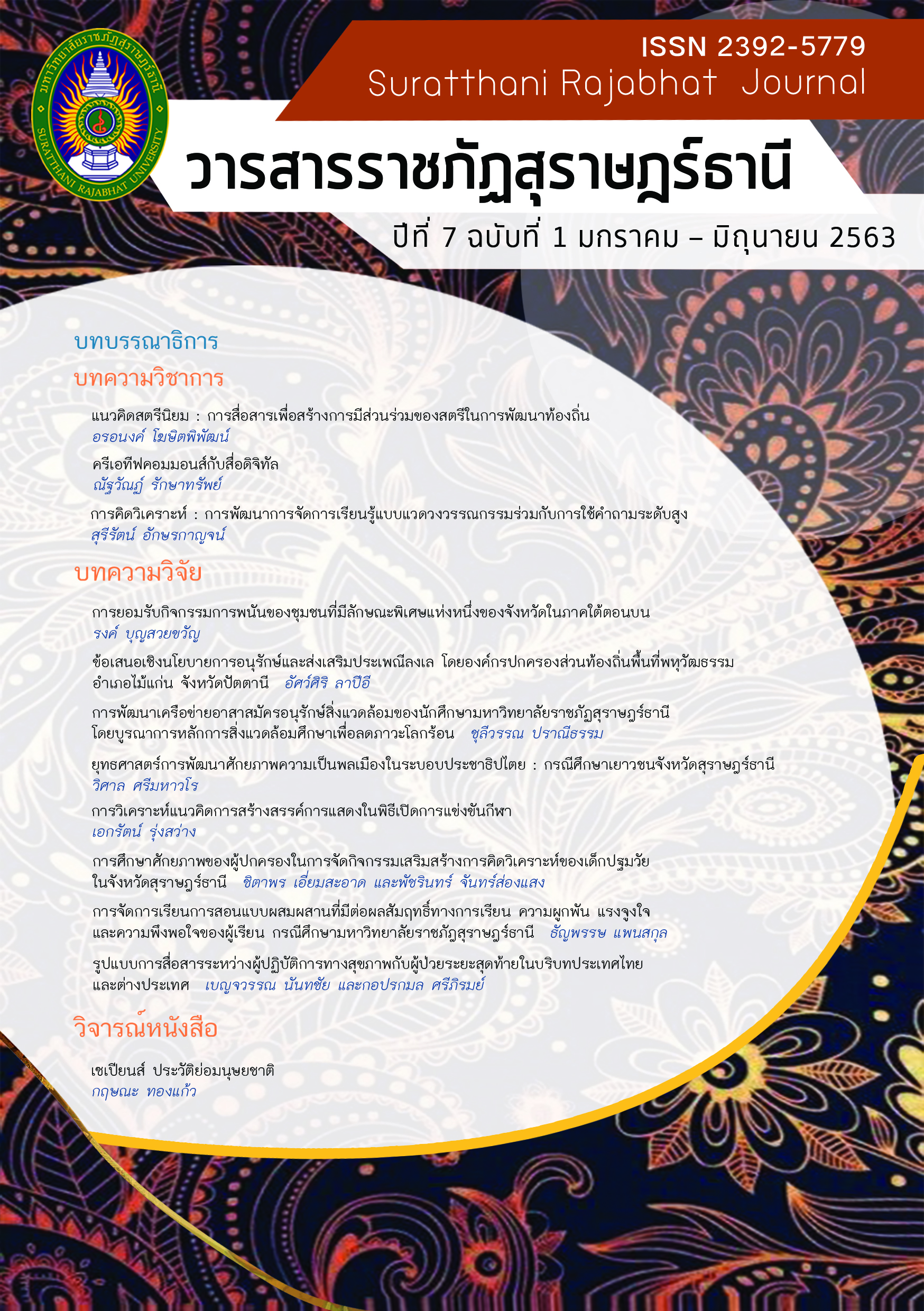Feminist Concept : Communication for Creating Women's Participation in Local Development
Main Article Content
Abstract
This article aimed to represent one of the current social issues of the way global postmodern thinking global has an impact on transforming and uprooting the traditional views towards women. Global feminism is an extension of feminism to a global level. Women roles are no longer a housewife and an obeyed wife. This has changed the way we think, learn, work, communicate and live. We are influenced by information technology and digital media. They have an impact on transforming women from traditional to postmodern. Women take double responsibilities both career and household responsibilities as mothers and wives. These have increased women’s social choices and life choices. Women gain employment opportunities and contribute in families’ expenses. These have promoted equality and empowerment of women. Women are not in the private sphere anymore. They participate in political processes, leadership in society and promote social networks as a communication platform. With their confidence and independence, they are capable to set up female social networks as a channel to communicate and to express their feeling and thoughts. These activities have increased their self - esteem, added value in life, raised consciousness in women and changed the way other people think about patriarchy.
Article Details
References
กรมกิจการสตรีและสถาบันครอบครัว. (2560). ยุทธศาสตร์การพัฒนาสตรี พ.ศ. 2560-2564. กรมกิจการสตรีและสถาบันครอบครัว. กรุงเทพฯ : กระทรวงการพัฒนาสังคมและความมั่งคงของมนุษย์.
กฤษฎา ศรีปราณ. (2556). อุปสรรคการเข้าสู่เส้นทางการเมืองของผู้หญิงในสังคมไทย : กรณีศึกษานักการเมืองหญิงไทย 6 ท่าน. วิทยานิพนธ์ปริญญามหาบัณฑิต. สาขาวิชาสตรีศึกษา วิทยาลัยสหวิทยาการ มหาวิทยาลัยธรรมศาสตร์.
กาญจนา แก้วเทพ. (2541). สตรีศึกษา. โครงการสตรีและเยาวชนศึกษา. กรุงเทพฯ : โรงพิมพ์มหาวิทยาลัยธรรมศาสตร์.
กำจร หลุยยะพงศ์. (2544). ครอบครัวกับความสัมพันธ์ที่ไม่มีวันแปรเปลี่ยน?. ในสตรีศึกษา2. กรุงเทพฯ. สำนักงานคณะกรรมการส่งเสริมประสานงานสตรีแห่งชาติ สำนักงานปลัดสำนักนายกรัฐมนตรี.
จุรี วิจิตรวาทการ. (2553). สตรีและเยาวชนศึกษากับการสร้างบ้านแปงเมือง. ใน มาลี พฤกษ์พงศาวลี (บก.)ม สตรีและเยาวชนศึกษา (1-15) กรุงเทพฯ : มหาวิทยาลัยธรรมศาสตร์.
ผุสดี ตามไทย. (2551). กรอบกฎหมาย : สิ่งเอื้ออำนวยให้ผู้หญิงเดินเข้าสู่การเมืองมากกว่าที่ผ่านมา. อ้างใน สตรีกับการเมือง : ความเป็นจริง พื้นที่ทางการเมือง และการขับเคลื่อน. กรุงเทพฯ : วิทยาลัยพัฒนาการปกครองท้องถิ่น สถาบันพระปกเกล้า.
เมทินี พงษ์เวช. (2541). ผู้หญิง บนเส้นทางแห่งอำนาจและการตัดสินใจ. กรุงเทพฯ : สถาบันวิจัยบทบาทหญิงชายและพัฒนา.
รุ่งนิภา เหลียง. (2561). สตรีกับการศึกษาในทัศนะของเพลโต. วารสารมหาวิทยาลัยศิลปากร, 38(3), 1-14.
วารุณี ภูริสินสิทธิ์. (2545). สตรีนิยม : ขบวนการและแนวคิดทางสังคมแห่งศตวรรษที่ 20. กรุงเทพฯ : ศูนย์หนังสือจุฬาลงกรณ์มหาวิทยาลัย
สถาบันพระปกเกล้า. (2551). สตรีกับการเมือง : ความจริงเรื่องพื้นที่ทางการเมืองและการขับเคลื่อน. กรุงเทพฯ : วิทยาลัยพัฒนาการปกครองท้องถิ่น
Beasley, Chris. (1999). What is Fiminism?. London : Sage Publications.
Durkop, M. (2017). Erscheinungsformendes Antisemitismus im Bund Deutscher Frauenvereine. Feministische Studien. 3(1), 140-164.
Linda, L. (2005). Qualities of woman leaders the unique leadership characteristics of women. Princeton: Princeton University Press.
Lowe, M & Margaret, B. (1991). “The Uneasy Alliance of Feminism and Academia” in A Reader in Feminist Knowledge. S. Gunew., Ed. London and New York: Routledge.
Mariarosa, .D. C. (2012). “Womenandthe Subversionof the Community”. The Commoner, issue 15 (Winter 2012), pp. 23-69.


